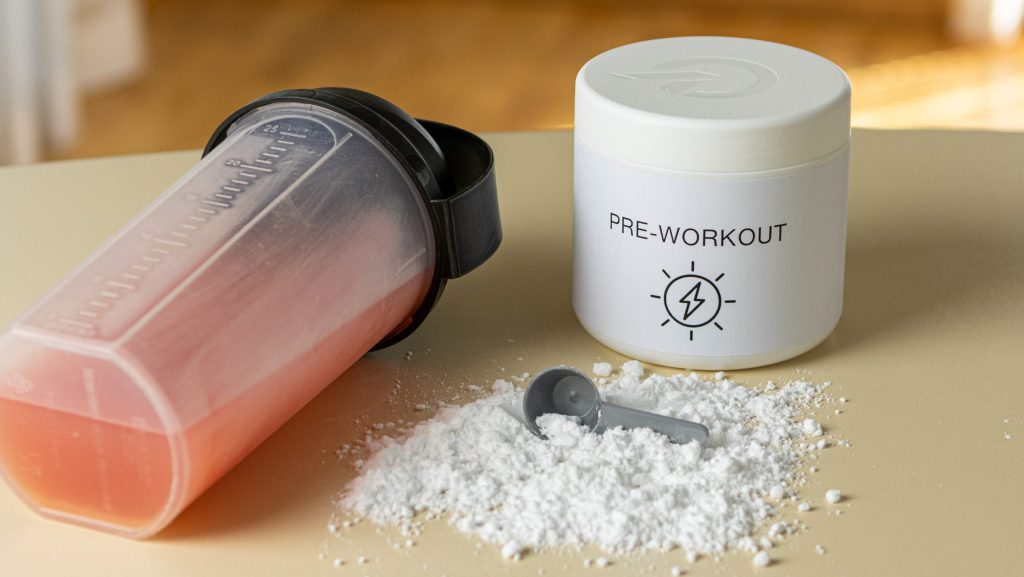Table of Contents
Welcome to the dynamic world of fitness and muscle building! If you’re a beginner in bodybuilding or someone just starting to explore the gym life, you’ve probably considered the role of muscle supplements in enhancing your workout results. It’s a journey filled with potential but navigating the sea of supplements can be overwhelming. How do you choose the right one? What’s safe and what isn’t?
You’re not alone in this quest. Many fitness enthusiasts grapple with these questions, seeking to boost their gains while ensuring health and safety. The market is flooded with options, each claiming to be the ultimate solution for muscle growth and recovery. This abundance of choices, while beneficial, can often lead to confusion and misinformation.
This article aims to be your reliable guide in selecting safe and effective muscle supplements, tailored specifically for beginners. We will delve into various types of supplements, uncover their benefits, and discuss how to integrate them wisely into your fitness routine. Expect to find a blend of scientific research, expert opinions, and practical tips to make your supplement journey both successful and safe.
Understanding Muscle Supplements
Muscle supplements are not just add-ons but pivotal elements in the fitness journey, designed to enhance physical performance, aid muscle growth, and facilitate recovery. They complement your diet and workout regimen, providing additional nutrients and compounds that support overall fitness.
Types of muscle supplements include:
- Protein Supplements: Like whey, casein, and plant-based proteins, essential for muscle repair and growth.
- Creatine: Increases muscle mass and improves exercise performance.
- Amino Acids: BCAAs and others, crucial for muscle recovery.
- Pre-Workout Supplements: Boosts energy and endurance.
- Post-Workout Supplements: Aids in recovery and muscle repair.
How Supplements Interact with the Body These supplements function by augmenting the body’s natural processes. Protein supplements supply amino acids, while creatine boosts energy production in muscles for strength and power. It’s important to recognize the immediate effects, such as the energy surge from pre-workout supplements, versus long-term benefits like muscle growth from proteins.
Matching Supplements with Fitness Goals
Choosing the right supplement hinges on your fitness objectives. For muscle gain, prioritize protein and creatine, while endurance-focused athletes might benefit more from amino acids and pre-workout formulas. It’s crucial to tailor your choice to your specific goals, and consulting a health professional can provide added clarity. Supplements should seamlessly integrate into a broader fitness strategy, complementing a balanced diet and regular exercise. They are not standalone solutions but tools that enhance the benefits of a healthy lifestyle.
‘Did You Know?’ Creatine is one of the most researched supplements, with studies showing it can increase muscle mass, strength, and exercise performance.
Muscle supplements are key to enhancing your fitness regime, but understanding them is crucial. Select supplements that align with your goals and integrate them thoughtfully into your diet and exercise routine, enhancing the hard work you put into your fitness journey. Remember, they’re there to complement, not replace, a balanced approach to health and fitness.

Protein Powders and Amino Acids
Protein is the cornerstone in fitness and bodybuilding, crucial for muscle repair and growth. Understanding the types and benefits of protein powders is key to making the right choice for your fitness goals.
- Whey Protein: Fast-absorbing, ideal for post-workout muscle recovery.
- Casein Protein: Slow-releasing, perfect for sustained muscle nourishment, especially overnight.
- Soy and Plant-Based Proteins: Suitable for vegetarians and vegans, these proteins offer a complete amino acid profile, challenging the myth that plant-based proteins are incomplete.
Aligning your protein powder choice with your fitness goals is essential. For muscle building, whey is often preferred, while soy or plant-based options might be better for weight management or for those with dietary restrictions like lactose intolerance or vegan preferences. Amino acids, particularly BCAAs, are vital for protein synthesis and muscle recovery. They not only facilitate muscle development but also help reduce fatigue and enhance endurance. Incorporating these supplements requires a balanced approach, with timing and dosage tailored to your workout intensity and dietary needs.
Simple Table: Recommended Protein Intake
| Fitness Goal | Protein Type | Recommended Timing |
|---|---|---|
| Muscle Gain | Whey Protein | Post-Workout |
| Weight Management | Soy/Plant-Based | Meal Replacement |
| Endurance Training | Casein Protein | Before Bed |
Myth vs. Fact
- Myth: More protein always results in more muscle.
- Fact: Protein intake should be balanced with overall diet and workout regimen.
- Myth: Plant proteins are inferior to animal proteins.
- Fact: Many plant-based proteins are complete and can be as effective as animal-based proteins.
By understanding the role and benefits of protein powders and amino acids, you can make informed choices that enhance your fitness trip. Whether you are building muscle, managing weight, or enhancing endurance, the right protein supplement can be a game-changer in achieving your goals.
Creatine for Muscle Growth
Creatine, a natural substance in muscle cells, plays a pivotal role in high-intensity workout energy. Its most popular form, creatine monohydrate, is renowned for its effectiveness. Creatine boosts phosphocreatine stores in muscles, aiding the production of ATP, vital for short bursts of power and strength. This mechanism not only enhances muscle endurance but also aids in faster muscle recovery, making it a favorite among various athletes.
Benefits for Different Athletes:
- Bodybuilders: Increases muscle volume and speeds up recovery.
- Sprinters & High-Intensity Athletes: Improves short-term performance.
- Endurance Athletes: Helps in sustaining longer workout sessions.
Creatine’s Broader Benefits Beyond Muscle Mass. While primarily known for muscle growth, creatine also contributes to overall fitness improvement, including potential cognitive enhancements. It’s present in red meat and fish, but supplementation offers a more practical and concentrated approach.
🛑 Addressing Myths and Safety Concerns
Despite misconceptions, scientific research validates creatine’s safety. It’s not linked to dehydration or kidney damage in healthy individuals. However, it’s always wise to consult a healthcare professional before starting any new supplement regimen, especially for those with pre-existing health conditions.
Effective Usage and Integration with Other Supplements. A daily intake of 3-5 grams of creatine is generally recommended. Contrary to popular belief, ‘loading’ isn’t necessary for everyone, and creatine doesn’t require cycling.
Did You Know? Creatine not only benefits physical performance but also shows potential in supporting brain health, enhancing memory and reducing mental fatigue.
Creatine, when used wisely and in conjunction with a balanced diet and regular exercise, can significantly boost your fitness journey, enhancing both muscle growth and overall performance.

Pre-Workout and Post-Workout Supplements
Pre-workout and post-workout supplements, each with distinct roles, work in tandem to enhance your workout efficiency and recovery process.
Pre-Workout Supplements: Boosting Energy and Endurance Supplements, taken before exercise, containing a mix of ingredients like caffeine for energy, beta-alanine for reduced fatigue, and nitric oxide precursors to improve blood flow, prime your body for maximum workout performance.
Post-Workout Supplements: Aiding Recovery and Muscle Growth Post-exercise, your body needs nutrients for repair and growth. Post-workout supplements often include protein for muscle repair, BCAAs for reduced soreness, and glutamine for immune support. They replenish what your body loses during a workout and accelerate recovery.
Choosing and Using Supplements Effectively
Selecting the right supplements should be based on individual fitness goals and body types. For instance, a pre-workout suitable for high-intensity training might differ from one for endurance workouts. Similarly, post-workout supplements should align with your recovery needs, like high protein content for muscle repair.
Table: Supplement Timing and Objectives
| Supplement Type | Objective | Ideal Timing |
|---|---|---|
| Pre-Workout | Energy & Endurance | 20-30 min before workout |
| Post-Workout | Recovery & Muscle Repair | Within 30-60 min after workout |
Balancing Supplements with Diet and Exercise
- Supplements should complement, not replace, a balanced diet.
- Adjust dosages according to your workout’s intensity and duration.
Common Pitfalls and Natural Alternatives. Overreliance on supplements can be counterproductive. Remember, they are supplements, not substitutes for real food. Some users might experience side effects, so it’s important to start with lower doses to assess tolerance.
Natural Alternatives:
- Pre-Workout: A combination of a banana and coffee can provide a natural energy boost.
- Post-Workout: A protein-rich smoothie made with Greek yogurt and fruits can be an effective natural recovery aid.
DIY Pre-Workout Snack Idea: Blend a banana, a scoop of oatmeal, and a teaspoon of honey for a quick, energy-boosting pre-workout snack.
By understanding the specific roles of pre- and post-workout supplements, you can make informed choices that enhance your workout performance and recovery. Integrating these supplements thoughtfully with your diet and exercise routine maximizes their benefits, helping you achieve your fitness goals more effectively.
Natural Supplements and Their Efficacy
Natural supplements, derived from food sources and plant extracts, represent an approach to fitness supplementation, contrasting with synthetic alternatives. The trend towards natural supplements in the fitness realm aligns with the broader movement of clean eating and health.
Comparing Natural and Synthetic Supplements
Natural supplements, while sometimes less potent than synthetic ones, are increasingly recognized for their effectiveness and broader nutritional profile. They can offer secondary plant compounds not found in synthetic versions, providing a more comprehensive health benefit.
Generally, natural supplements have fewer additives, leading to a lower risk of adverse reactions. However, it’s crucial to consider the quality and source of these supplements to ensure safety.
Specific Natural Supplements for Muscle Growth and Fitness
- Beta-Alanine: This natural compound, enhancing muscle endurance, is found in protein-rich foods like poultry and fish.
- Natural BCAAs: Derived from foods like eggs and meat, they are essential for muscle repair and growth.
Incorporating natural supplements effectively requires aligning them with your overall dietary and fitness goals. They should complement a well-rounded diet and regular exercise routine, not replace them.
Pros and Cons of Natural Supplements
Advantages:
- Align with a holistic health approach.
- Offer broader health benefits beyond muscle growth.
- Typically contain fewer additives and chemicals.
Limitations:
- Variability in potency and concentration.
- Often more costly than synthetic alternatives.
Making Informed Choices
Selecting the right natural supplements involves thorough research into their sources and quality. Opt for third-party tested products for purity and potency.
Did You Know? Natural supplements can sometimes offer unexpected health benefits, like improved skin health or enhanced immune function, due to their diverse range of nutrients.
Tip: Start with a lower dosage of natural supplements and gradually increase it to assess your body’s response. This approach helps in finding the right balance that works for your body and fitness goals.
Natural supplements can be a valuable part of your fitness routine. By understanding their unique benefits and limitations, and integrating them wisely into your regime, you can maximize their positive impact on your fitness and overall well-being.
Conclusion: Safe Muscle Supplements for Beginners
This exploration of muscle supplements aims to arm you with the knowledge to make well-informed decisions. Whether you’re considering synthetic or natural options, always prioritize safety and efficacy. Consulting healthcare professionals, especially for beginners, is a step not to be overlooked.
Remember, supplements are just one part of a larger picture that includes a balanced diet and regular exercise. Armed with this information, you’re now better equipped to navigate the complex world of muscle supplements and make choices that align with your fitness goals and overall health.
Citations:
- Supplements with purported effects on muscle mass and strength, Pubmed
- Nutritional supplements to increase muscle mass, Pubmed
- Creatine Supplementation for Muscle Growth: A Scoping Review of Randomized Clinical Trials from 2012 to 2021, Pubmed Central